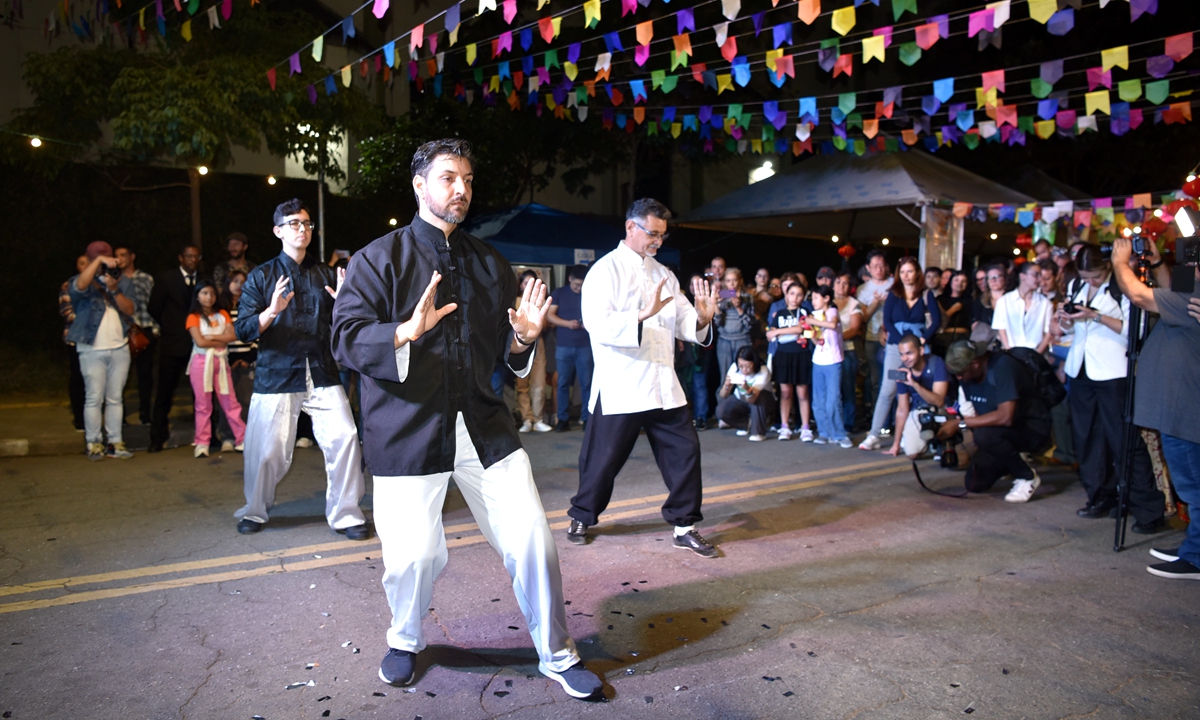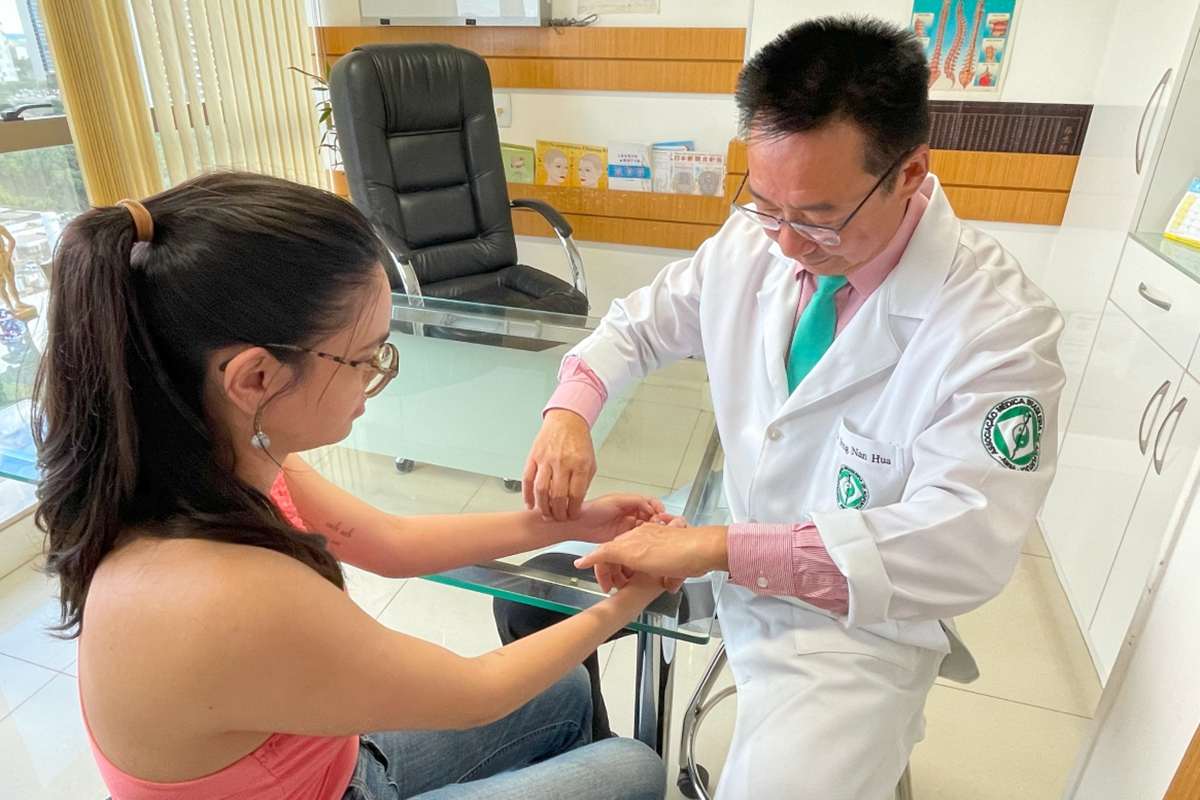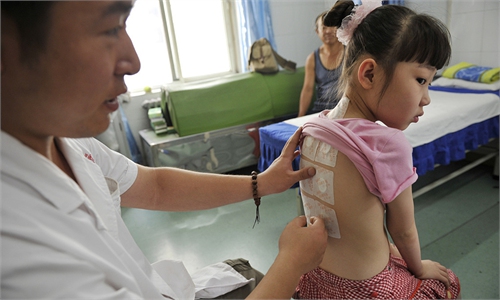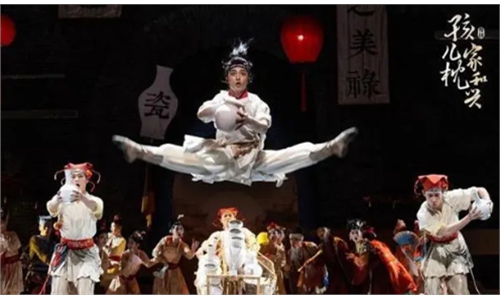ARTS / CULTURE & LEISURE
Popularity of tai chi, acupuncture in Brazil underscores culture bonds
Facing East for healing

Brazilians practice tai chi in Sao Paulo. Photo: VCG
Brazil has witnessed a surge in the popularity of traditional Chinese practices in recent years, with tai chi and acupuncture key among them. As more Brazilians seek holistic approaches to health and wellness, these ancient disciplines are gaining traction across the nation, and becoming links for the promotion of cultural exchanges and spiritual bonding between the two peoples.The year 2024 marks the 50th anniversary of the establishment of diplomatic relations between China and Brazil. Chinese President Xi Jinping published a signed article in Brazilian media outlet Folha de S. Paulo on Sunday. "China and Brazil boast rich, diverse and uniquely fascinating cultures that are complementary and drawn to each other," the article said. "We should uphold openness and inclusiveness, values that are imbued in our traditions, and deepen our exchanges and cooperation in the areas of culture, education, science and technology, health, sports, tourism, and at the subnational levels."
Harmony in motion
Tai chi, often described as "meditation in motion," combines gentle physical exercise with mindfulness and deep breathing. In Brazil, community classes have sprung up in parks and squares, attracting participants of all ages.
On Monday local time, a vibrant scene unfolded at the "Square of Harmony" in Brasilia, where nearly 60 members of a local community gathered for tai chi lessons.
Hildo Couko, a retired professor at the University of Brasilia, has been practicing tai chi for about two decades. He told the Global Times that in 2005, he was passing by a park and saw a group of people practicing tai chi, which sparked curiosity in him, which was rewarded when a German invited him to join in.
"Then I join 'forever.' It changed my life," Couko said, noting that tai chi makes him healthier, and is a beautiful way to connect body and mind.
Tai chi is growing in Brazil. Even in small towns, you can see people practicing tai chi, Couko said, noting that there are several other groups practicing tai chi all over Brasilia.
Woo Moo-Shong, 93, graces the morning practice with his presence. As a prominent figure in the promotion of tai chi, he has been leading classes in the public square since 1974. Participants from various religious backgrounds and nationalities gather daily to practice tai chi under his guidance. Revered as Master Woo, his contributions to cultural dialogue have been recognized multiple times by the Brazilian government.
Master Woo, born in the island of Taiwan, expressed a deep desire to promote and elevate Chinese culture globally.
He highlighted the support he received from the Chinese Embassy in Brazil, which provided him with tai chi materials from China. "Tai chi is a treasure left by our ancestors," he stated. Through tai chi, many people have come to understand that China is not only known for its martial arts but also for tai chi, which symbolizes health, harmony, and peaceful coexistence.
"At my age, I hope to contribute to the health and happiness of not only Chinese people and Brazilians, but all of humanity," he remarked.
Aristein Tai Shyn Woo, son of Master Woo who owns a clinic in Brasilia, has also witnessed the positive impact of tai chi, noting that it has helped many individuals improve their health. Under their promotion, Brasilia now boasts 43 clinics that introduce tai chi to patients, aiding them in their recovery and overall well-being.
The Brazilian government has listed tai chi as one of the "recommended health sports," the Global Times learned. Tai chi has approximately 250,000 practitioners in Brazil, according to CGTN.
Reviving ancient healing
Acupuncture, a cornerstone of traditional Chinese medicine (TCM), is also experiencing a renaissance in Brazil. Many Brazilians are turning to acupuncture for relief from chronic pain, anxiety, and other health issues.
On Monday, the Global Times visited Dr Song Nanhua's clinic in Brasilia, where he practices acupuncture. A quick search on the map revealed that within a 4-kilometer radius of his clinic, there are over 20 acupuncture clinics. Notably, some of these are named after renowned ancient Chinese physicians, such as Hua Tuo, highlighting the deep cultural roots and growing popularity of TCM.

Dr Song Nanhua, a Chinese-Brazilian physician, takes a Brazilian patient's pulse after acupuncture treatment in Brasilia on November 18, 2024. Photo: Wang Qi/GT
Song was born in 1963 in Southwest China's Yunnan Province, a region famous for its medicinal herbs. During an exchange program in the 1990s to Brazil, Song recognized the immense potential for the growth of Chinese acupuncture in the South American country. And he decided to stay and establish himself as an acupuncturist in the country. To ensure his legal practice, Song dedicated nine years to completing the local medical curriculum, and successfully passing the medical licensing exam.Through his dedication to noble medical ethics and exceptional skills, Song has gained the trust and admiration of a growing number of Brazilians.
In his bustling clinic, the Global Times observed a steady stream of Brazilian patients seeking medical attention, forcing the doctor to frequently pause our interview. It became clear that Song's clinic is a vital resource for the local community, as he typically sees around 40 patients a day.
A variety of patients present with different symptoms, including abdominal pain, headaches, insomnia, tinnitus, and rheumatoid arthritis in Song's clinic. He revealed to the Global Times that acupuncture has won the recognition of the Brazilian people because of its remarkable therapeutic effect.
Chinese medicine has given Brazilians a solution to many diseases that Western medicine could not solve. Both their government healthcare system and the general public hold Chinese medicine in high esteem, Song said.
Brazil incorporated acupuncture into the national medical systems in 2006, with a growing number of doctors learning how to administer the treatment. It currently has 150,000 licensed practitioners, with 30,000 more being trained each year, according to CGTN.
There are 260 public hospitals in Brazil which own treatment rooms offering acupuncture treatment for free to Brazilians, according to Song.
Anna, 25, shared her experience of treating chronic abdominal pain, which persisted despite countless consultations involving Western medicine. Lacking effective solutions, she turned to the internet and discovered acupuncture. After a treatment two weeks ago, Anna reported a marked improvement in her pain levels and expressed satisfaction with the treatment.
"When Western treatments fail to provide relief, many Brazilians turn to TCM, especially acupuncture," Anna notes. "It's amazing how much of an impact just a few needles can have without the need for medication."
Song emphasized that TCM is a Chinese cultural treasure, representing the nation's soft power, values, and lifestyle. The growing popularity of acupuncture in Brazil is seen as a recognition of Chinese culture.
He expressed his pride in promoting TCM and Chinese culture in Brazil, which not only enhances the friendship between the two countries but also brings health and happiness to the Brazilian people.




